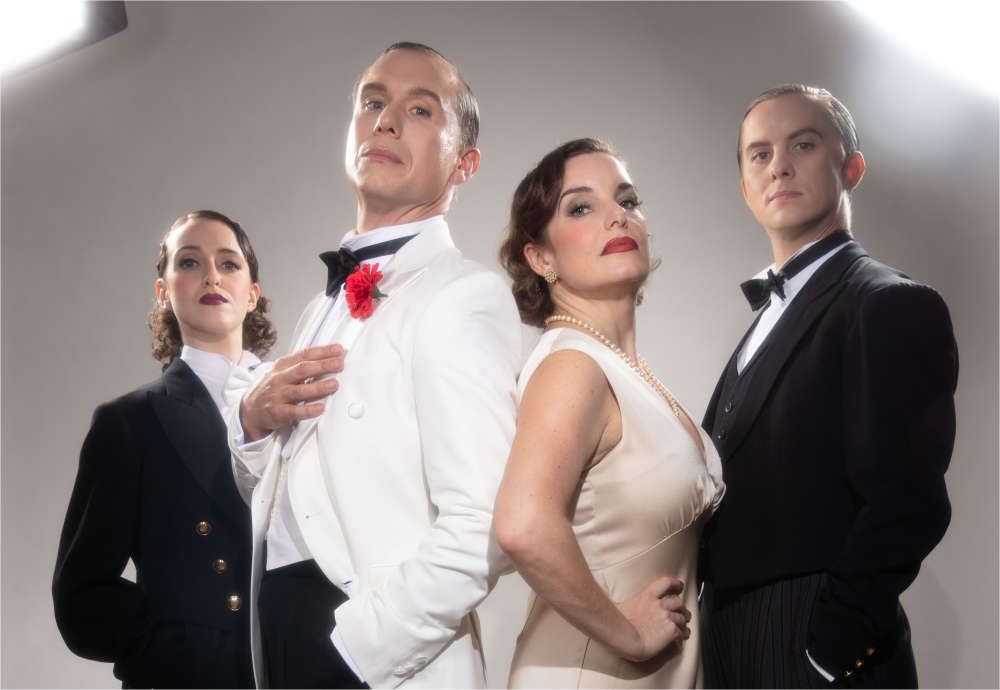
While an older audience may have more to glean from it, "Noël and Gertie” remains exquisite and impressive.
Noël Coward was a creative force in the British theatre scene of the early to mid-twentieth century, a playwright, actor, and composer. Gertrude Lawrence was an actress, singer, and creative muse to Coward for the majority of their extensive careers.
Tragically, Lawrence’s contributions to the art form remain confined to the distant, hallowed halls of the stage and lost to time. “Noël and Gertie” seeks to change that, placing the relationship between these bohemians from the time of their first meeting centre-stage.
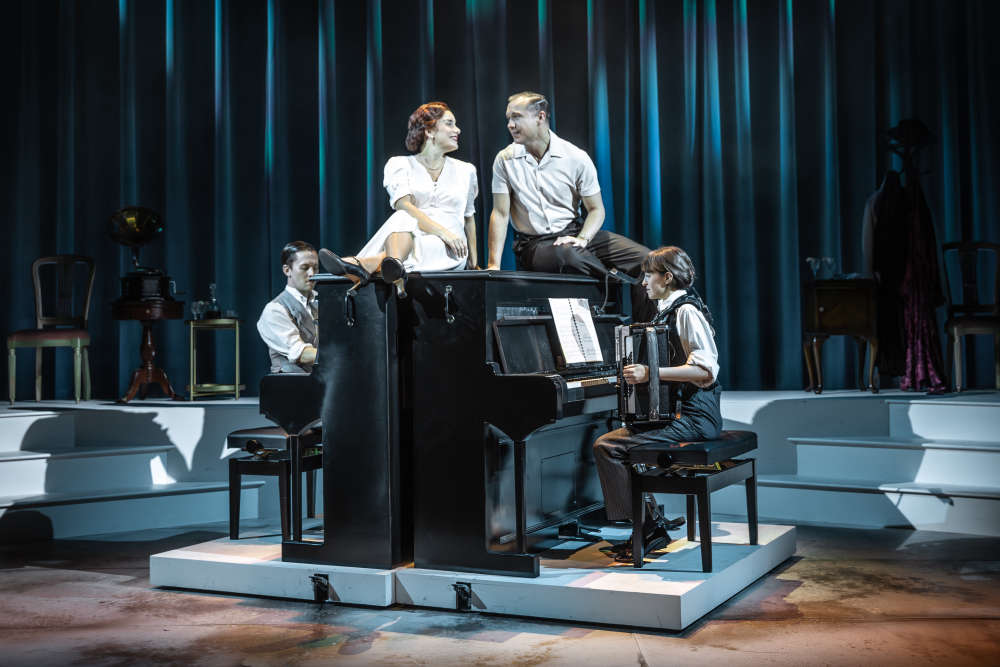 Rebecca Trehearn as Gertie Lawrence, Joey Hickman & Michaela Murphy as Ensemble and Musicians, Gary Tushaw as Noël Coward
Rebecca Trehearn as Gertie Lawrence, Joey Hickman & Michaela Murphy as Ensemble and Musicians, Gary Tushaw as Noël Coward
The show is simple, yet effective. A cast of four, though aside from minor asides and fleeting episodic characters, Joey Hickman and Michaela Murphy are primarily responsible for just the live music produced throughout the show. This haunting yet upbeat waltz underscores every scene of Noël and Gertie’s delightful interactions.
Thus, “Noël and Gertie” is much a two-hander, with simple staging and a plain backdrop, allowing the focus to remain on the two stand-out, sweeping performances.
Gary Tushaw as Noël Coward and Rebecca Trehearn as Gertie Lawrence are cast to perfection. Tushaw’s flamboyant wit, which he inhabits, makes his mannerisms impossible to take your eyes off. Coward is vicious in how he talks to his friends and enemies, and it may be easy for the venom to turn an audience away from its protagonist. Yet, Tushaw remains comfortable with the audience eating out of his hand at every turn.
Trehearn is likewise monumental as Gertie, this magnificent and multi-layered woman - as Coward says, “nobody knew what was going on [in her mind], least of all herself.” Both deliver every line in a considered and studied manner, giving lines the weight they deserve and filling the theatre.
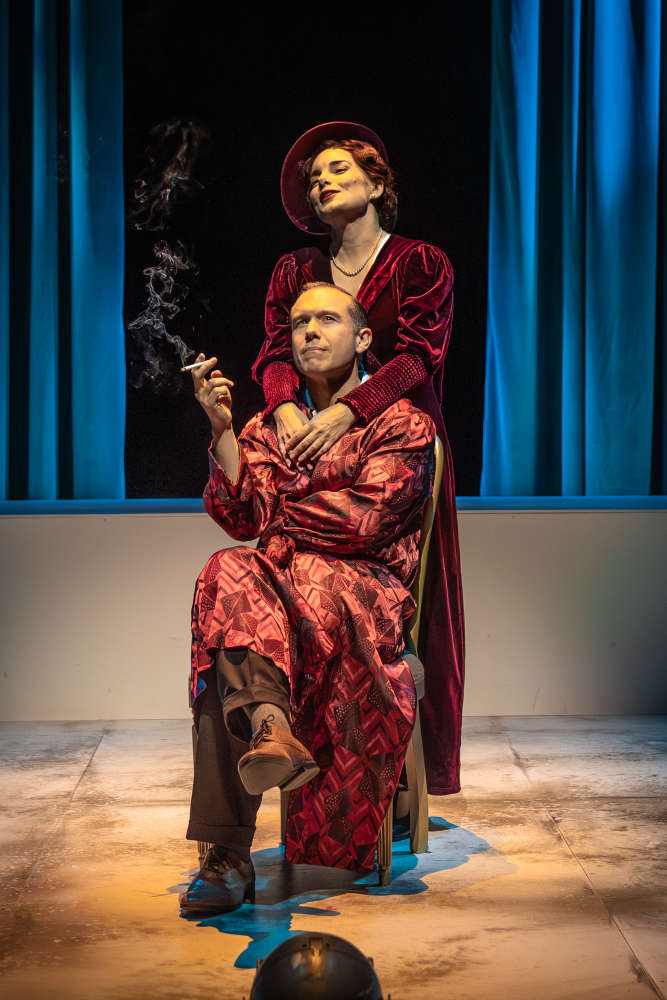
Rebecca Trehearn as Gertie Lawrence, Gary Tushaw as Noël Coward
The show is structured like a biography, Noël and Gertie telling the audience an account of their lives, intertwining together. The dialogue draws heavily on Coward’s own words, including his letters and diaries, and the songs included throughout are taken from his extensive discography of work spanning a storied life.
There is sometimes a stretch to work the more renowned of his songs into the narrative being told; “Don’t Put Your Daughter On the Stage, Mrs Worthington” is so endearingly entertaining that it makes up for its sudden appearance.
There is also a sense that while Noël and Gertie’s dynamic is consistently entertaining, perhaps it lacks sufficient material to sustain a show for over two hours. The duo performed a series of one-act plays as part of “Tonight at 8.30”, and the middle third of the show features a series of vignettes showcasing moments from multiple of these plays. It's these sequences that had me questioning the sustainability of the rest of the production.
While “Has Anybody Seen Our Ship” draws appeal from juxtaposing the boisterous stage presence with the fragmented relationship of the duo off-stage, its raunchy humour still frustrated rather than emboldened me, and ending Act One with it felt like an anticlimax.
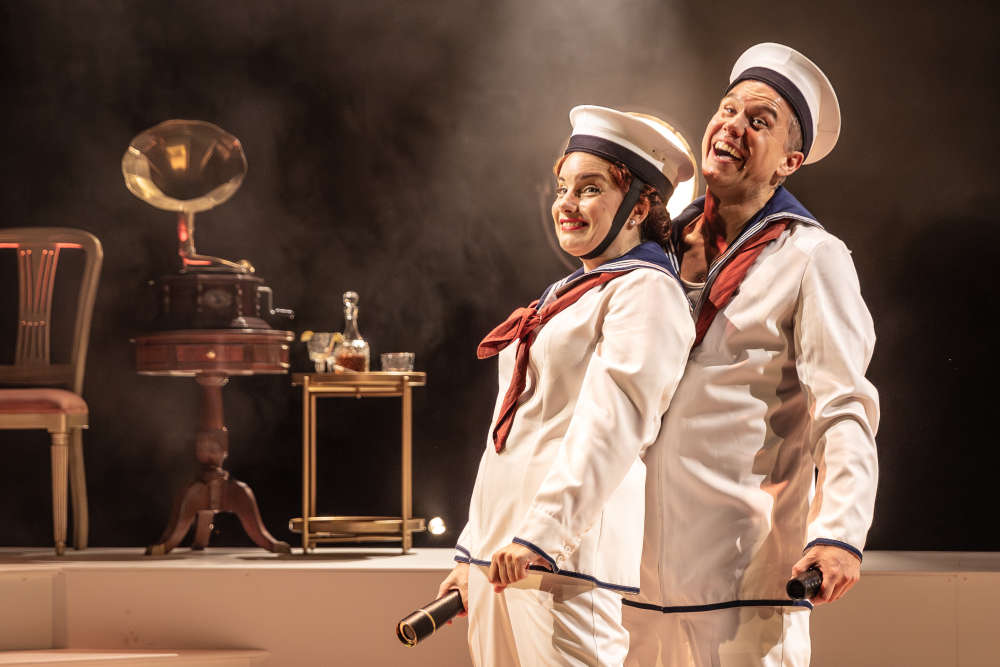 The costumes used by Noël and Gertie during "Has Anybody Seen Our Ship".
The costumes used by Noël and Gertie during "Has Anybody Seen Our Ship".
Luckily, my interest was piqued after the interval by a heartbreakingly tender scene between the two during the performance of a snippet of “Still Life”, a rare serious production as part of “Tonight at 8:30”. The play went on to be adapted for the screen as “Brief Encounter”, and what we saw here serves as a strong advertisement for me seeking out the whole thing.
My favourite part of the entire piece came shortly after this, where a further scene between Gerturde playing Laura Jesson, and Noël playing Alec Harvey, is recontextualised with Noël stepping into Laura’s dialogue, and Joey Hickman speaking for Alec.
The suggestion of Noël’s homosexuality, forced to keep hidden in the era, both lovers despairing at the torture of having to repress their burning love for each other, was beautiful. While I did wish Noël’s sexuality was addressed slightly more, this was the best way to do it while still containing Noël’s own words, as he refused to speak on it even when it was less taboo.
By the end of the piece, further emotional developments leave your heart in your chest, and even my brushing against the musical did little to dissuade my heart fluttering in despair as you want so desperately for the two to keep making their art forever.
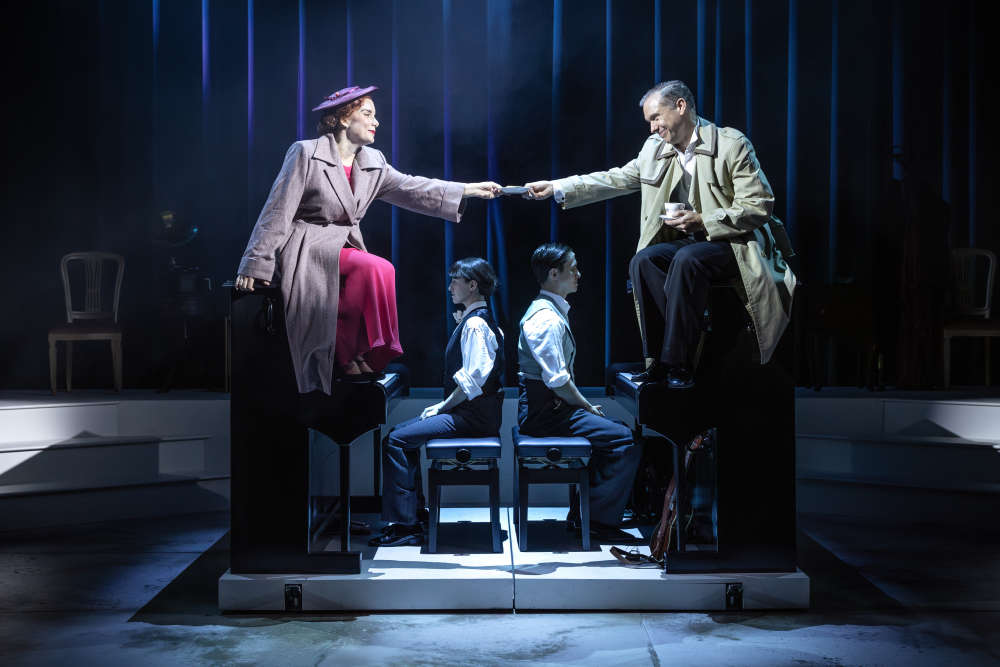 The use of pianos as instruments and for staging.
The use of pianos as instruments and for staging.
It was by this point that even though Noël and Gertie haven’t spent so time together as themselves during the play, the reality of their dynamic presents itself to you. There have been numerous bickering couples of all kinds: hidden romances, first meetings, and ex-spouses drawn back together—people who are unquestionably devoted to each other in all their forms.
The attachment and emotions assigned to these characters are, in turn, transferred to Noël and Gertie through the roles they inhabit. It's a masterful trick, and makes the whole piece greater than the sum of its parts.
I feel like I’ve brushed over just how amusing much of it is as well, and for audiences already familiar with Noël Coward, and wanting to see a new side of him, this is certainly produced directly for you. For a younger audience unfamiliar with Coward's music and the era he represents, there may not be as much to grasp.
Still, my opinions had certainly swayed between half-time and night’s end, and I can’t stress how “Don’t Put Your Daughter on the Stage, Mrs Worthington” has stuck itself in my head as an exquisite comedy song.
“Noël and Gertie” continues its run at Mayflower Studios until Saturday, 27th September, and you can book your tickets here: https://www.mayflower.org.uk/whats-on/noel-gertie-2025/#.


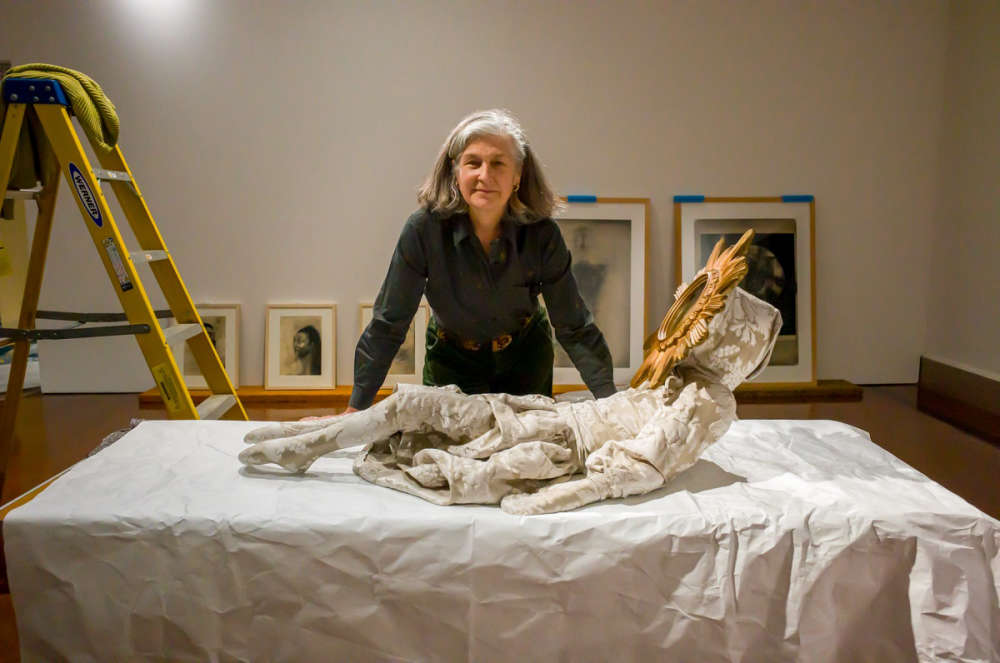 Southampton City Art Gallery Reopens Saturday 7 March
Southampton City Art Gallery Reopens Saturday 7 March
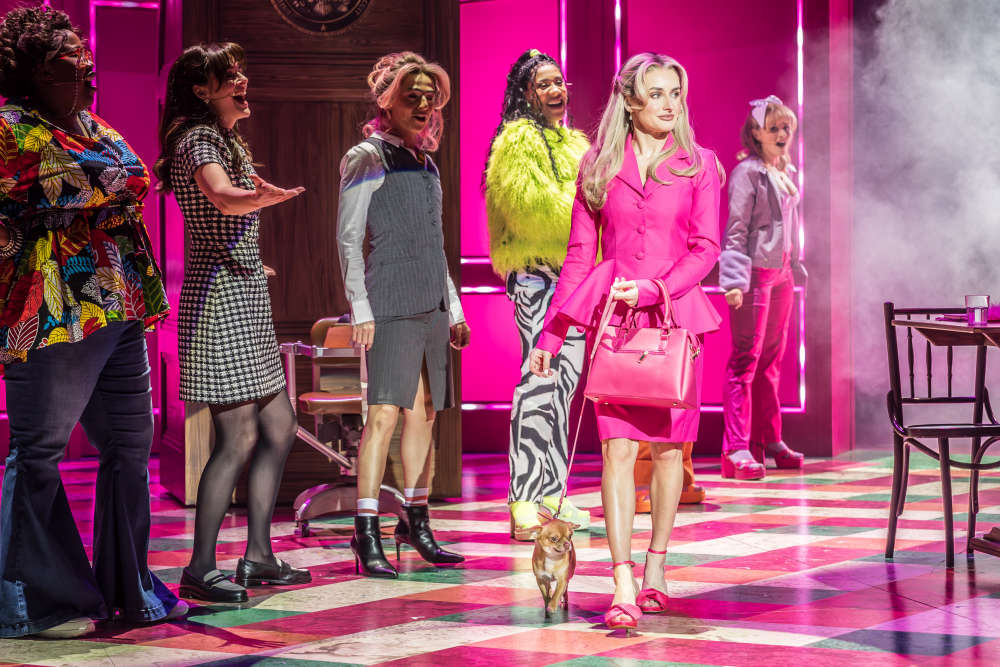 Review: Legally Blonde The Musical at Mayflower Theatre
Review: Legally Blonde The Musical at Mayflower Theatre
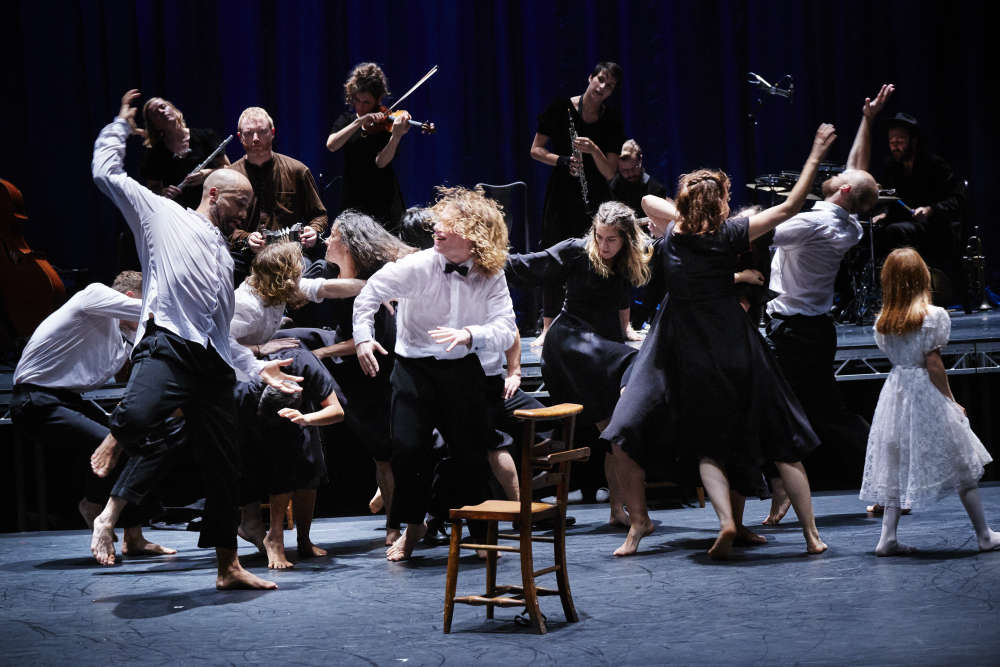 Review: MÁM at Mayflower Theatre
Review: MÁM at Mayflower Theatre
 Interview with Sun Electric to air on 'Sine Waves On Sunday'
Interview with Sun Electric to air on 'Sine Waves On Sunday'
 Kraftwerk, Live in Southampton, 1981: Were You There?
Kraftwerk, Live in Southampton, 1981: Were You There?




